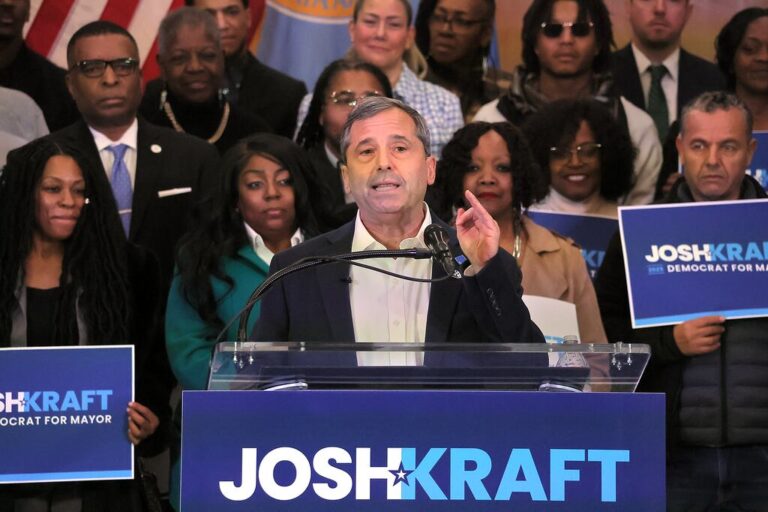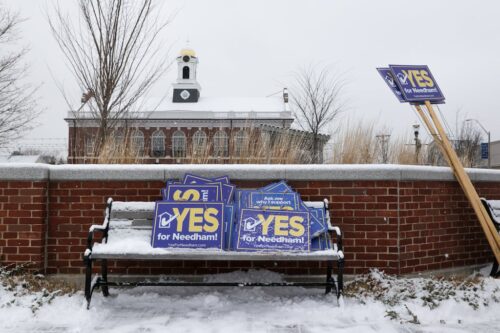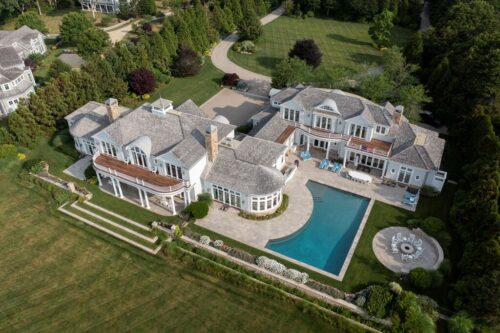In a campaign launch video posted to YouTube Monday, a simple slogan appears just below Josh Kraft’s name.
“More housing. More opportunity.”
And at the formal launch of his mayoral campaign Tuesday at Prince Hall in Dorchester, Kraft — the longtime nonprofit leader and son of billionaire Patriots owner Robert Kraft — doubled down, attacking Mayor Michelle Wu’s record on housing while unveiling a rent control proposal of his own and promising to increase the production of homes.
“On the number one challenge facing our residents, access to housing that regular people can afford, production under Mayor Wu has ground to a dead halt,” Kraft said. “I know it’s a complex problem, but at its core, you can’t solve a housing crisis if you’re building less of it.”
In the first 24 hours of his campaign, Kraft has made it clear: This year’s mayor’s race will largely center on housing.
Boston mayor’s race off to a fiery start as Josh Kraft launches campaign to unseat Michelle Wu
It is a fitting hook for the contest to lead a city with some of the highest housing costs in the world, where rents have been rising rapidly for years and longtime residents are routinely priced out of neighborhoods they could once afford.
While most Bostonians agree that housing affordability has become the city’s biggest issue, the politics of what to do about it are messy and often do not follow traditional partisan lines. Some residents hate gentrification and love rent control. The city’s powerful developers hate rent control and love free-market policies. Homeowners sometimes push back against new development but also wrestle with rising property taxes.
To take almost any clear stance on housing issues is often to alienate a powerful swath of the electorate.
And while Wu and Kraft seem to agree that housing is the city’s most pressing issue, Kraft’s pitch is that Wu has not done enough.
Wu, a progressive who herself was the only one of six major candidates four years ago to support rent control, has sought to position herself as a strong advocate for both affordability and neighborhood-conscious planning. She has directed hundreds of millions of dollars into building and preserving affordable housing, even as the overall permitting of new homes has decreased during her term — in large part due to higher interest rates and materials costs that have plagued developers nationwide.
She also strengthened the city’s inclusionary development policy, requiring a higher share of units in most new buildings to be set aside at income-restricted rents, and introduced new net-zero building codes. Both of those policies are popular among progressives but can make building apartments more expensive.
And some of her major housing policy pursuits — namely, rent control, or rent stabilization, as Wu tends to call it — have been thwarted by state lawmakers, stalling efforts to provide immediate aid to struggling renters.

At a separate event Tuesday, Wu said she was proud of her administration’s progress on housing, citing efforts to build affordable housing and streamline the city’s permitting process.
“Housing prices are too high. We hear that from every neighborhood, and that has been the case for a very long time,“ Wu said. ”We are pushing with everything we have on that front.”
Kraft, however, took aim Tuesday at Wu over housing generally, and rent control specifically, calling it a failed campaign promise.
“Mayor Wu promised us rent control three years ago; we will deliver it,” Kraft said.
Kraft said his rent control proposal would involve landlords receiving tax breaks from the city if they promised to limit annual rent increases. His campaign said it would release more details of the proposal next week but believed that, unlike Wu’s proposed rent cap, it would not need to be approved by the Legislature.
Speaking on the online talk show “Java with Jimmy” Wednesday morning, Wu fired back at Kraft and questioned his proposal.
“A good landlord tax break is not the same as rent control,” Wu said.
Kraft’s broader jab at Wu’s housing record hints at a bigger rift that has emerged during her term. Her suite of policies targeting affordability — including a push for a tax on high-dollar real estate transactions and increased affordable housing requirements — has rubbed many developers, long some of the most influential powerbrokers in Boston, the wrong way and raised their cost of doing business.
Wu, meanwhile, has in recent months pushed to frame her term as mayor as one of the most significant periods of investment in affordable housing in the city’s history.
The two campaigns are already citing dueling numbers to illustrate their respective cases.
Kraft, at his announcement Tuesday, appeared to reference a 2023 study that found some 23,000 approved units were stalled and not yet under construction as evidence that Wu’s policies have hindered development. (The city has since launched a $100 million fund to accelerate those stalled developments.)

The Wu administration, meanwhile, points to the nearly 20,000 housing units that have been built or started construction since she took office, though that figure also counts projects that were permitted or broke ground under her predecessors. And, they note, more of that housing is affordable than ever before.
“In Boston, over the last three years, we have permitted more affordable housing than in nearly a decade,” Wu said Tuesday. “We are proud of the progress that we’ve made on that front.”
Whether that’s enough, or Boston voters want more, will likely be a key question on the campaign trail for months to come.
Niki Griswold of the Globe Staff contributed to this report.
The latest consequence for rejecting a state housing law: Firefighter equipment grantsNeedham voters just rejected the town’s state-mandated housing plan. Now what?Renters struggle to afford housing in Greater Boston more than owners, Census data shows



Comment count: